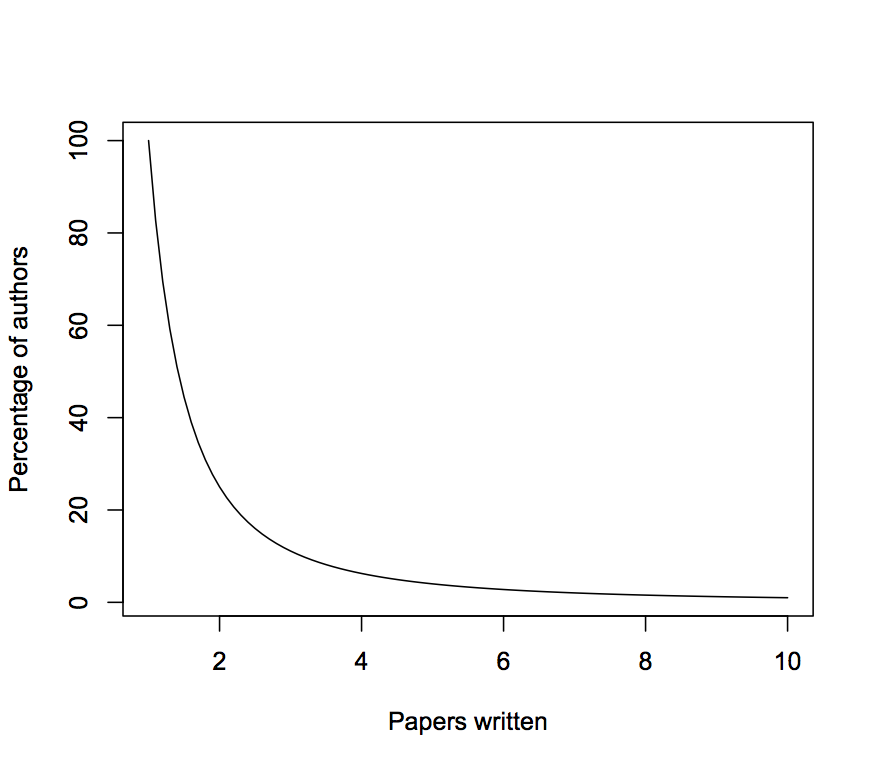Lotka's Law on:
[Wikipedia]
[Google]
[Amazon]
Lotka's law, named after Alfred J. Lotka, is one of a variety of special applications of

National Institute of Statistics
*
to fit a Lotka power law distribution to observed frequency data.
''The Journal of the Washington Academy of Sciences'', vol. 16
{{DEFAULTSORT:Lotka's Law Bibliometrics Statistical laws
Zipf's law
Zipf's law (; ) is an empirical law stating that when a list of measured values is sorted in decreasing order, the value of the -th entry is often approximately inversely proportional to .
The best known instance of Zipf's law applies to the ...
. It describes the frequency of publication by authors in any given field.
Definition
Let be the number of publications, be the number of authors with publications, and be a constant depending on the specific field. Lotka's law states that . In Lotka's original publication, he claimed . Subsequent research showed that varies depending on the discipline. Equivalently, Lotka's law can be stated as , where is the number of authors with ''at least'' publications. Their equivalence can be proved by taking thederivative
In mathematics, the derivative is a fundamental tool that quantifies the sensitivity to change of a function's output with respect to its input. The derivative of a function of a single variable at a chosen input value, when it exists, is t ...
.

Example
Assume that n=2 in a discipline, then as the number of articles published increases, authors producing that many publications become less frequent. There are 1/4 as many authors publishing two articles within a specified time period as there are single-publication authors, 1/9 as many publishing three articles, 1/16 as many publishing four articles, etc. And if 100 authors wrote ''exactly'' one article each over a specific period in the discipline, then: That would be a total of 294 articles and 155 writers, with an average of 1.9 articles for each writer.Software
* Friedman, A. 2015. "The Power of Lotka’s Law Through the Eyes of R" The Romanian Statistical Review. Published bNational Institute of Statistics
*
to fit a Lotka power law distribution to observed frequency data.
Relationship to Riemann Zeta
Lotka's law may be described using the Zeta distribution: : for and where : is theRiemann zeta function
The Riemann zeta function or Euler–Riemann zeta function, denoted by the Greek letter (zeta), is a mathematical function of a complex variable defined as \zeta(s) = \sum_^\infty \frac = \frac + \frac + \frac + \cdots for and its analytic c ...
. It is the limiting case of Zipf's law
Zipf's law (; ) is an empirical law stating that when a list of measured values is sorted in decreasing order, the value of the -th entry is often approximately inversely proportional to .
The best known instance of Zipf's law applies to the ...
where an individual's maximum number of publications is infinite.
See also
* Price's law *Riemann zeta function
The Riemann zeta function or Euler–Riemann zeta function, denoted by the Greek letter (zeta), is a mathematical function of a complex variable defined as \zeta(s) = \sum_^\infty \frac = \frac + \frac + \frac + \cdots for and its analytic c ...
* Zeta distribution
References
Further reading
* — Chung and Cox analyze a bibliometric regularity in finance literature, relating Lotka's law to the maxim that " the rich get richer and the poor get poorer", and equating it to the maxim that "success breeds success".External links
*''The Journal of the Washington Academy of Sciences'', vol. 16
{{DEFAULTSORT:Lotka's Law Bibliometrics Statistical laws